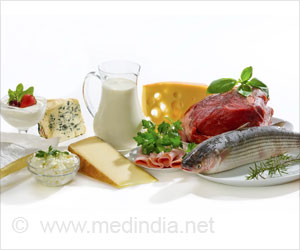Starting babies and toddlers with a low-protein Nordic-style diet could be the key to healthier eating habits.
- Nordic diet, low in protein, can help instill healthier eating habits in babies
- Protein reduction in the Nordic diet is replaced with carbohydrates from vegetables and not from cereals
TOP INSIGHT
Starting babies and toddlers with a low-protein Nordic-style diet could be the key to healthier eating habits.
Nordic Diet for Babies
Researchers from the University of Umeå, Sweden, Stockholm County Council Centre for Epidemiology, and the University of California, USA, followed two groups of babies from 4-6 months through to 18 months, as part of the OTIS trial (see editor’s notes below). A total of 250 babies took part and 82% completed the trial.The study found marked differences in the dietary habits of the toddlers in the 2 groups. Those on the new Nordic diet, who had been supplied with Nordic home-made baby food recipes, protein-reduced baby food products, and offered parental support via social media, consumed 42% to 45% more fruit and vegetables at 12 to 18 months of age, compared to those who were fed the conventional diet currently recommended by the Swedish Food Agency.
While fruit consumption within the conventional group remained consistent, babies fed the conventional diet reduced their vegetable intake by 36% between 12 and 18 months.
Babies on the Nordic diet had an average protein intake 17% to 29% lower than those on the conventional diet at 12 to 18 months of age. This was still within recommended protein intake levels and the overall calorie count between the two groups was the same.
The protein reduction in the Nordic diet group was replaced by more carbohydrates from vegetables, not more cereals, together with some extra fat from rapeseed oil.
Commenting on the findings, Dr. Johansson says: “A Nordic diet with reduced protein introduced to infants naive to this model of eating, increased the intake of fruit, berries, vegetables, and roots, establishing a preferable eating pattern lasting over a 12-month period.”
“A Nordic diet reduced in protein is safe, feasible and may contribute to sustainable and healthy eating during infancy and early childhood,” she added.
The novel research could pave the way to broadening the taste spectrum in infants and potentially provide an effective strategy for instilling healthier eating habits early in life.
What is Nordic Diet?
The Nordic diet has a higher intake of regionally and seasonally produced fruit, berries, vegetables, herbs, mushrooms, tubers and legumes, as well as whole grains, vegetable fats and oils, fish and eggs, and a lower intake of sweets, desserts and dairy, meat, and meat products.Typical Nordic fruits include lingonberry, buckthorn berry, cranberry, raspberry, and blueberry, as well as fiber-rich vegetables such as turnip, beets, swede, root celery, carrots, parsnip, cabbage, broccoli, cauliflower and kale.
Chair of the ESPGHAN Nutrition Committee, Prof. Jiri Bronsky, stated: “The authors have shown a significant effect of the diet in 12 and 18 months of age of the children. The Nordic diet group consumed more fruit and vegetables and less protein than the control group. The Nordic diet was well tolerated and did not negatively affect the growth of the child or breastfeeding duration. Importantly, this research demonstrates that this diet is safe, feasible and exposes infants to a variety of flavors which may influence long-lasting food preferences.”
Source-Eurekalert
 MEDINDIA
MEDINDIA





 Email
Email






